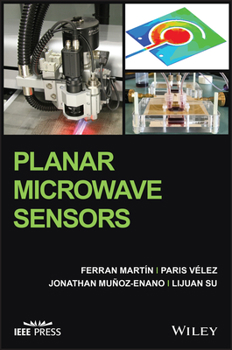Planar Microwave Sensors
Comprehensive resource detailing the latest advances in microwave and wireless sensors implemented in planar technology
Planar Microwave Sensors is an authoritative resource on the subject, discussing the main relevant sensing strategies, working principles, and applications on the basis of the authors' own experience and background, while also highlighting the most relevant contributions to the topic reported by international research groups. The authors provide an overview of planar microwave sensors grouped by chapters according to their working principle.
In each chapter, the working principle is explained in detail and the specific sensor design strategies are discussed, including validation examples at both simulation and experimental level. The most suited applications in each case are also reported. The necessary theory and analysis for sensor design are further provided, with special emphasis on performance improvement (i.e., sensitivity and resolution optimization, dynamic range, etc.). Lastly, the work covers a number of applications, from material characterization to biosensing, including motion control sensors, microfluidic sensors, industrial sensors, and more.
Sample topics covered in the work include: Non-resonant and resonant sensors, reflective-mode and transmission-mode sensors, single-ended and differential sensors, and contact and contactless sensors Design guidelines for sensor performance optimization and analytical methods to retrieve the variables of interest from the measured sensor responses. Radiofrequency identification (RFID) sensor types, prospective applications, and materials/technologies towards green sensors implementation Comparisons between different technologies for sensing and the advantages and limitations of microwave sensors, particularly planar sensors
Engineers and qualified professionals involved in sensor technologies, along with undergraduate and graduate students in related programs of study, can harness the valuable information inside Planar Microwave Sensors to gain complete foundational knowledge on the subject and stay up to date on the latest research and developments in the field.





